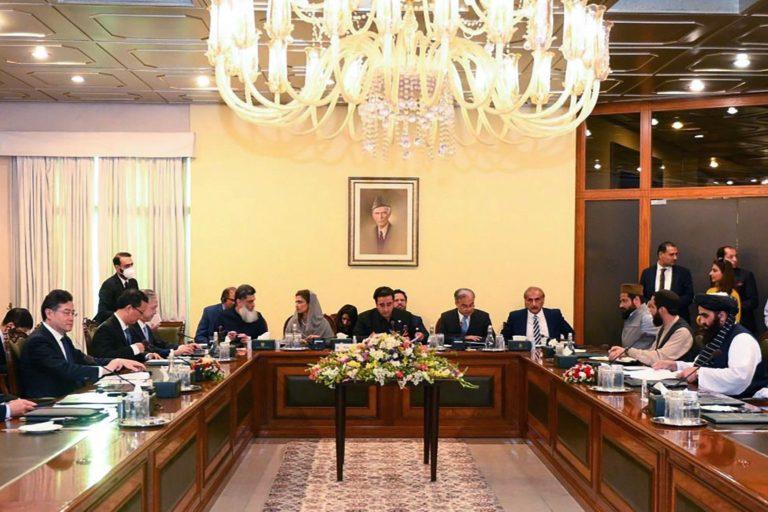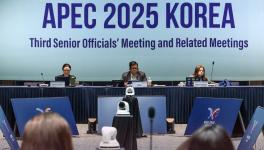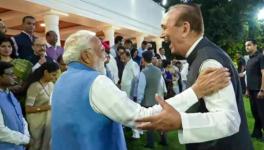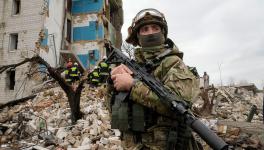Russia, China Take Holistic View of Pamirs, Hindu Kush

A trilateral foreign minister level meeting agreed to extend China-Pakistan Economic Corridor to Afghanistan, Islamabad, May 5, 2023
The Xi’an Declaration, issued after the First China-Central Asia Summit at Xi’an on May 18-19, takes a direct hit at the West’s interference in the region, scattering the notion in Washington and Brussels that Russia and China’s dominance on the Central Asian steppe is not sustainable as Russia is “overstretched” in the Ukraine conflict.
As events turned out, Russia has not only not been “defeated” in Ukraine but turned the table around in the proxy war. The US is now pleading with Europeans that Moscow should not be allowed to garner victory in the battlefields. What a fallback position!
To be sure, China’s decision in the context of the Ukraine crisis to assume a leadership role in Central Asia as provider of security is a paradigm shift that profoundly undercuts the very essence of the US’ Indo-Pacific strategy to isolate and contain China. Look at the map to comprehend why the West’s talk of encirclement of Russia and China will remain a pipe dream so long as Inner Asia remains out of bounds.
The US is working like a spider to create a web of states in southeast Asia to split and atomise the ASEAN and repeat the “regime change” in Thailand all across the Greater Mekong Region. In such a volatile setting aimed at surrounding China with a ring of unstable states, Central Asia assumes critical importance for both Russian and Chinese strategies as a region that is beyond the reach of US influence.
The relevant paragraph of the Xi’an Declaration says: “The parties are unanimous that ensuring state security, political stability and constitutional order is of key importance, and resolutely oppose attempts to discredit legitimate state power and provoke ‘colour revolutions’, as well as interference in the internal affairs of other countries in any of its forms and under any pretext. The Parties emphasise that democracy is the common aspiration and value of humanity. The independent choice of the development path and management model concerns the sovereignty of each country and is not subject to intervention.”
It must be noted carefully that within a week of the Xi’an Summit, Russia received a top security official from Beijing who came on an unprecedented week-long visit to Moscow for consultations — Chen Wenqing, Member of the Political Bureau and secretary of the Commission for Political and Legal Affairs of the CPC Central Committee, who is the counterpart of Nikolay Patrushev, head of Russia’s Security Council, the highest ranking security official in the Kremlin.
Receiving Chen and his delegation in Moscow, Patrushev said: “Expanding and deepening relations with friendly China are Russia’s strategic course. Our country prioritises the development of mutually beneficial cooperation with People’s Republic of China in all areas, provision of mutual assistance and boosting coordination in the foreign arena for ensuring security, stability, sustainable development at the global and regional levels both in Eurasia and other parts of the world.”
In concluding remarks at the end of Chen’s visit to Moscow, Patrushev noted: “Not only Russia is one of the centres of the multipolar world. So is China. They (Western countries) think they can cope with Russia and as soon as they have done that, they hope, their next target will be China. They find it difficult to deal with both in parallel. What they have been doing now on the border of China, with Taiwan, we also know well enough. In general, it is difficult to disagree with their (Chinese side’s) position.”
Clearly, the Russia-China security talks in Moscow at the highest level are expected to give the necessary underpinnings to the joint efforts to forge regional security and stability in their common space, against the backdrop of the growing security risks they jointly face in Eurasia and the return of terrorism in Central Asia. This strategic congruence is already evident in the close similarity in the Russian and Chinese approaches to the stabilisation of Afghanistan, which is already having a positive impact despite all incipient western attempts since the Taliban takeover to keep the Hindu Kush in a state of turmoil and civil war.
The Chinese State Councillor and Foreign Minister Qin Gang who attended the Pakistan-Afghanistan-China trilateral meeting in Islamabad on May 5 left three messages to his Pakistani hosts — China is ready to help Pakistan revive its economy; Beijing is also ready to work with Pakistan to advance high-quality Belt and Road cooperation, accelerate the development of the CPEC, and deepen cooperation; and, above all, China is ready to work with Pakistan to “strengthen communication and coordination on the Afghan issue, promote peace and reconstruction in Afghanistan, and help maintain regional stability and development.”
Importantly, Qin Gang called for the extension of the China-Pakistan Economic Corridor to Afghanistan so as to “increase good-neighbourliness and mutual trust among the three countries in the spirit of mutual respect, candidness and friendship, mutual benefit and win-win results.” Qin Gang conveyed to his Pakistani and Afghan counterparts that China is ready to strengthen counter-terrorism and security cooperation and “join efforts to firmly combat terrorist forces including the East Turkestan Islamic Movement and Tehrik-i-Taliban Pakistan, so as to defend regional security and stability.”
Interestingly, Qin Gang assured Acting Foreign Minister of the Afghan Interim Government Amir Khan Muttaqi at a bilateral meeting that Beijing intends to “deepen China-Afghanistan cooperation in various fields, and help Afghanistan realise self-reliance, peace, stability, development and prosperity at an early date.”
A leading Chinese regional expert Zhu Yongbiao, director of the Centre for Afghanistan Studies at Lanzhou University, told the Global Times that “Over the past few years, Pakistan and Afghanistan had severe conflicts and disputes over the borderlines, and the trilateral meeting itself was a rare opportunity to promote peace and talks.”
Zhu said Kabul and Islamabad have differences on the recognition of terrorism, “especially under external interference when countries like the US and India hold double standards in the matter”, therefore, China has released a signal that could be seen as “a step forward in coordinating the stances of Pakistan and Afghanistan.”
Besides, the Chinese expert noted that both Afghanistan and Pakistan being neighbours of China and sharing good political relations with China, are also aware of China’s role in not only mediating between Saudi Arabia and Iran but also on the Ukraine crisis, so both would have expectations for China, and the trilateral meeting in Islamabad “signalled their enhanced confidence in China’s diplomatic role.”
Evidently, just short of according formal recognition of the Taliban government, Moscow and Beijing have stepped up their dealings with Kabul. This increases the comfort level in the Central Asian capitals. Russia, Central Asian states and China share an existential threat perception from terrorism and religious extremism, which is a time-tested element in the US toolbox. Thus, there is an understanding amongst them to deny the US any basing facilities in the region or to allow the “Afghan Resistance” of Panjshiris to use Central Asia as sanctuary to fuel another civil war.
China and Russia have contributed significantly to the stabilisation of the Taliban rule in Afghanistan. Basically, they appreciate that the Taliban rulers, under extremely difficult conditions have nonetheless acquitted themselves relatively well. This is also the perception in the Central Asian capitals.
Therefore, from a regional perspective, the extension of the CPEC to Afghanistan and its inevitable integration with Central Asia’s intensifying BRI project is to be viewed as the most tangible spin-off from the China-Central Asia format. These processes will strengthen the SCO — and, hopefully, would also bring India on board at some point.
MK Bhadrakumar is a former diplomat. He was India’s ambassador to Uzbekistan and Turkey. The views are personal.
Get the latest reports & analysis with people's perspective on Protests, movements & deep analytical videos, discussions of the current affairs in your Telegram app. Subscribe to NewsClick's Telegram channel & get Real-Time updates on stories, as they get published on our website.























